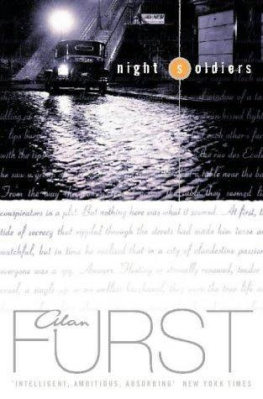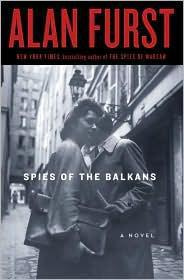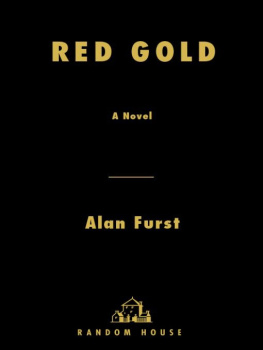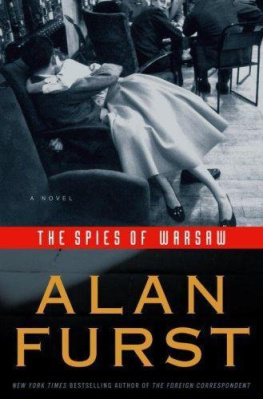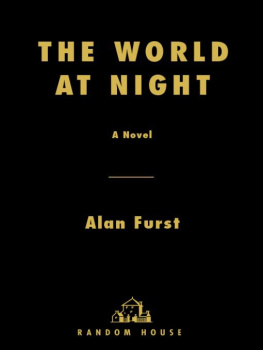Alan Furst - The Polish Officer
Here you can read online Alan Furst - The Polish Officer full text of the book (entire story) in english for free. Download pdf and epub, get meaning, cover and reviews about this ebook. genre: Detective and thriller. Description of the work, (preface) as well as reviews are available. Best literature library LitArk.com created for fans of good reading and offers a wide selection of genres:
Romance novel
Science fiction
Adventure
Detective
Science
History
Home and family
Prose
Art
Politics
Computer
Non-fiction
Religion
Business
Children
Humor
Choose a favorite category and find really read worthwhile books. Enjoy immersion in the world of imagination, feel the emotions of the characters or learn something new for yourself, make an fascinating discovery.

- Book:The Polish Officer
- Author:
- Genre:
- Rating:3 / 5
- Favourites:Add to favourites
- Your mark:
- 60
- 1
- 2
- 3
- 4
- 5
The Polish Officer: summary, description and annotation
We offer to read an annotation, description, summary or preface (depends on what the author of the book "The Polish Officer" wrote himself). If you haven't found the necessary information about the book — write in the comments, we will try to find it.
The Polish Officer — read online for free the complete book (whole text) full work
Below is the text of the book, divided by pages. System saving the place of the last page read, allows you to conveniently read the book "The Polish Officer" online for free, without having to search again every time where you left off. Put a bookmark, and you can go to the page where you finished reading at any time.
Font size:
Interval:
Bookmark:
Alan Furst
The Polish Officer
THE PILAVA LOCAL
In Poland, on the night of 11 September 1939, Wehrmacht scout and commando units-elements of Kuechlers Third Army Corps-moved silently around the defenses of Novy Dvor, crossed the Vistula over the partly demolished Jablonka Bridge, and attempted to capture the Warsaw Telephone Exchange at the northern edge of the city. Meeting unexpected, and stubborn, resistance, they retreated along Sowacki Street and established positions on the roof and in the lobby of the Hotel Franconia, called for dive-bomber attacks on the exchange building, and settled in to wait for the light of dawn.
Mr. Felix Malek, proprietor of the Franconia, put on his best blue suit, and, accompanied by a room-service waiter, personally served cognac to the German soldiers at their mortar and machine-gun positions. He then descended to the wine cellar, opened the concealed door to an underground passage originally dug during the Prussian attack of 1795, hurried down Sowacki Street to the telephone exchange, and asked to see the gentleman in charge.
He was taken up a marble staircase to the directors office on the fifth floor and there, beneath a somber portrait of the director-pince-nez and brushed whiskers-presented to the officer in command, a captain. The captain was an excellent listener, and the questions he asked inspired Mr. Malek to talk for a long time. Arms, unit size, insignia, the location of positions-he was surprised at how much he knew.
When he was done, they gave him tea. He asked if he might remain at the exchange, it would be an honor to fight the Germans. No, they said, perhaps another day. So Mr. Malek made his way through the night to his sisters apartment in the Ochota district. And what, she asked, were they like?
Mr. Malek thought a moment. Educated, he said. Quite the better class of people.
Mr. Malek had not been thirty years an innkeeper for nothing: the defenders of the Warsaw Telephone Exchange, hastily recruited amidst the chaos of the German invasion, were officers of Polish Military Intelligence, known, in imitation of the French custom, as the Deuxime Bureau. The Breda machine gun at the casement window was served by a lieutenant from the cryptographic service, a pair of spectacles folded carefully in his breast pocket. The spidery fellow reloading ammunition belts was, in vocational life, a connoisseur of the senior civil service of the U.S.S.R., while the commander of the machine gun, feet propped on the tripod, was Lieutenant Karlinski, heavy and pink, who in normal times concerned himself with the analysis of Baltic shipping.
The officer in charge, Captain Alexander de Milja, was professionally a cartographer; first a mapmaker, later assistant director of the bureaus Geographical Section. But Poland was at war-no, Poland had lost her war, and it was clear to the captain that nobody was going to be assistant director of anything for a long time to come.
Still, you couldnt just stop fighting. Captain de Milja stood at the open window; the night air, cool and damp, felt especially good on his hands. Idiot! Hed grabbed the overheated barrel of the machine gun to change it during the attack, and now he had red stripes on his palms that hurt like hell.
4:20 A.M. He swept the faade of the hotel with his binoculars, tried-based on the proprietors intelligence-counting up floors to focus on certain rooms, but the Germans had the windows shut and all he could see was black glass. In Sowacki Square, a burned-out trolley, and the body of a Wehrmacht trooper, like a bundle of rags accidentally left in a doorway, weapon and ammunition long gone. To somebodys attic. De Milja let the binoculars hang on their strap and stared out into the city.
A refinery had been set on fire; a tower of heavy smoke rolled majestically into the sky and the clouds glowed a faint orange. A machine gun tapped in the distance, a plane droned overhead, artillery rumbled across the river. War-fire and smoke-had made autumn come early, dead leaves rattled along the cobblestones and caught in the iron drain covers.
Captain de Milja was a soldier, he knew he didnt have long to live. And, in truth, he didnt care. He was not in love with life. One or two things had to be taken care of, then matters could run their course.
The directors telephone was, naturally, of the very latest style; black, shiny, Bakelite plastic. De Milja dialed the military operator he had installed in the basement.
Sir?
Sergeant, have you tried Tarnopol again?
Cant get through, sir. Ive been up to Wilno, and down to Zakopane, just about every routing there is, but the whole regions down. Were pretty sure the lines have been cut, sir.
Youll keep trying.
Yes, sir.
Thank you, Sergeant.
He replaced the receiver carefully on its cradle. He had wanted to say good-bye to his wife.
The Wehrmacht assault team got its air support at dawn; three Focke-Wulf 189s diving out of the clouds, engines screaming, cannon firing. But there was more drama than destruction; the 189 carried only one bomb. On the fifth floor of the telephone exchange, Lieutenant Karlinski swept the Breda across the sky and hammered off belt after belt of 7.35 ammunition. Grand streams of tracer, pale in the early light, showered up into the clouds, while hot casings ejected onto the directors Persian carpet and the office smelled like smoldering wool-until a bullet fired from the ballroom of the Hotel Franconia hit Karlinski in the collarbone and he collapsed back onto the floor and died of shock.
The lieutenant from the cryptographic service took over, while Captain de Milja steadied the tripod with his burning hands and the Russian bureaucracy expert fed belts into the gun. But by then the Focke-Wulfs had run dry of ammunition and headed back to Germany. At which point the telephone rang and somebody on the first floor, voice flat and controlled, informed de Milja that the building was on fire.
For a moment he went blank, the solution much too obvious. Then he said, Call the fire department. Which they did and which, on 12 September, worked quite well because the citys water mains hadnt yet been destroyed. The firemen ran their hoses into the building on the side away from the fighting and pumped high-pressure streams on the flames, putting out the fire and, as water sluiced down into the switching stations, shutting down every telephone in Warsaw.
The Wehrmacht attack, from doorway to doorway up Sowacki Street, faltered, then collapsed. The support fire, machine-gun and mortar, from the roof of the hotel lasted less than a minute, then the positions were abandoned. Just before dawn de Milja had sent sniper teams to the roofs of adjacent buildings, and when the fighting started theyd knocked down first a mortar man, then an officer. It was improvised-the snipers were armed with hunting weapons and policemens automatic pistols-but it worked.
De Milja watched through binoculars as an analyst from the economic intelligence section-the captain thought he specialized in feed grains-a man in his fifties wearing suspenders and a shirt turned up at the sleeves, suddenly appeared at a parapet on the roof of an apartment building and fired both barrels of an old shotgun, the sort of thing one found in the back halls of country houses, along with leather game bags and warped tennis rackets.
The sniper broke the shotgun and withdrew the empty cartridges. Smoke seeped from the barrels as he thrust new shells into the breech. Get down, the captain thought. He saw two German troopers at an upper window, bringing their rifles to bear. Down. The sniper lurched backward, his face showed a moment of pain. But he kept his balance, braced one foot against the parapet and fired both barrels. His shoulder jerked with the recoil, then he fell to his knees, shaking his head grimly at whatever was going on inside him.
Font size:
Interval:
Bookmark:
Similar books «The Polish Officer»
Look at similar books to The Polish Officer. We have selected literature similar in name and meaning in the hope of providing readers with more options to find new, interesting, not yet read works.
Discussion, reviews of the book The Polish Officer and just readers' own opinions. Leave your comments, write what you think about the work, its meaning or the main characters. Specify what exactly you liked and what you didn't like, and why you think so.

